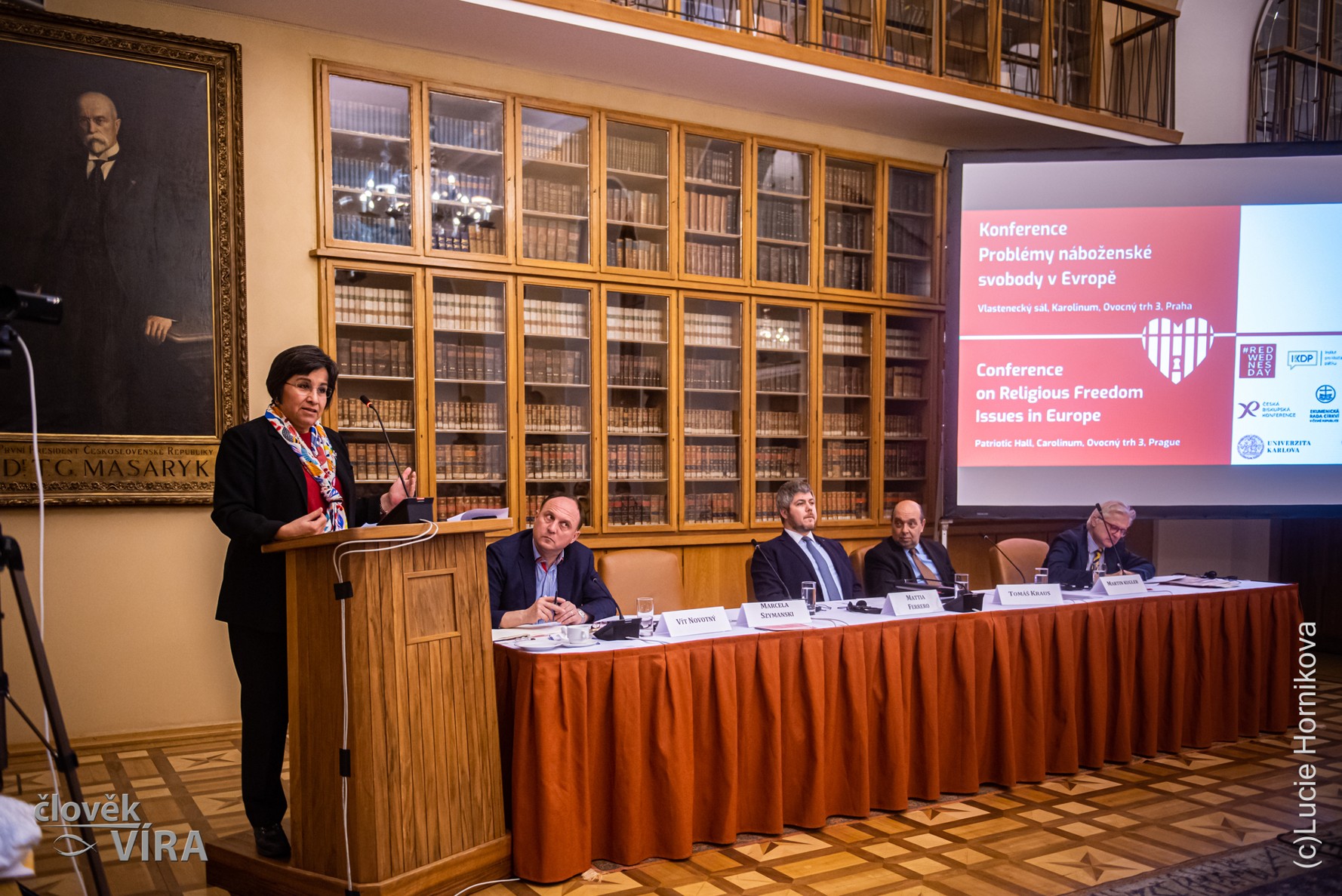
Religious Freedom Issues in Europe
On November 27th, 2019, the international conference “Religious Freedom Issues in Europe” was held in the Hall of Patriots in Carolinum, Charles University in Prague.
The event was organized by Institute for Christian Democratic Politics (IKDP) and Wilfried Martens Centre for European Studies, in cooperation also with Czech Bishops’ Conference, Ecumenical Council of Churches in the Czech Republic and Federation of Jewish Communities in the Czech Republic. The conference was held under the auspices of the rector of Charles University Mr Tomáš Zima and the former Czech MEP Mr Pavel Svoboda who is at the same time the chairman of Administrative Board of Institute for Christian Democratic Politics.
It was already the third year of the conference on persecution for religious beliefs, this year for the first time organised on the occasion of the international initiative Red Wednesday (#RedWednesday) – an international day to draw attention to the plight of those who are persecuted and oppressed for their religious beliefs.
The conference hosted high level speakers from many countries, i.e. Rabbi David Rosen from American Jewish Committee in Jerusalem, Israel, Mrs Marcela Szymanski from Aid to the Church in Need International (ACN), Mr Martin Kugler from Observatory on Intolerance and Discrimination against Christians in Europe and Mr Tomáš Kraus from Federation of Jewish Communities in the Czech Republic, and several of them represented international expert lawyers and barristers on human rights, e.g. Mrs Ruth Nordström from Scandinavian Human Rights Lawyers, Mr Robert Clarke from Alliance Defending Freedom (ADF) International, as well as Mr Mattia Ferrero from Catholic University of Milan.
The conference was simultaneously interpreted and moderated by Mr Vít Novotný, a representative of Wilfried Martens Centre for European Studies.
Rabbi David Rosen drew attention to current antisemitism, raising that luckily, the Christian church represented by the Pope currently respect and revere Jewry and Judaism. Ruth Nordström presented two cases of midwifes in Sweden which are currently processed at the European Court of Human Rights – these midwifes had been basically prohibited to work because they according to their (religious) belief had not wanted to perform abortions, and at a certain stage of court hearings they had been compared to jihadists. Ruth also mentioned that the time has come for us to change the way of thinking in the meaning not to do something for it is secure, politically correct or popular but for the fact that it is right. The third and the last to speak in the first panel was Robert Clarke pointing out that leaders in our countries often speak of cases in other countries (mostly the Third World countries) denouncing the affairs there, although many similar or basically the same affairs happen even in our countries but these leaders consider them to be different. The speakers’ presentations were followed by a discussion on whether there should be any limits to the freedom of speech (be free to speak out but not to offend others), mentioning that what is convenient in one place (geographically) might but does not have to be a good solution in another place as the societies in different countries are not all the same and comparable.
In the second panel, Marcela Szymanski played a short video introducing the bi-annual report “Persecuted and Forgotten” covering 196 countries all over the world, and continued saying inter alia that we lose freedom of religious belief and of speech step by step, it is not only a problem of the Third World; the freedom of belief is declared by the Charter of Fundamental Rights and Freedoms but it is the governments who limit the freedom of belief at most. Mattia Ferrero spoke of hate crimes and anti-Christian vandalism, introducing the audience the pyramid of hate and the legal aspects of individual acts of hatred. He mentioned that 70–80 % of crimes committed due to religious hatred mainly target properties because religious buildings etc. are easily recognisable. Tomáš Kraus spoke of antisemitic vandalism saying that it has increased in the last years by 25 %, mentioning that it is like a virus which mutates: it is still the same antisemitism like 100 years ago but it has changed as even the society has changed meanwhile. Martin Kugler in his presentation on “How to React” to all the tragic and dramatic trends and challenges that had been presented by other speakers mentioned that democracy needs Christianity and we need to understand the reasons of the acts first; Martin said that he as a Christian cannot speak for Jews but it is well visible that at least in Europe, Christians and Jews protect the same heritage; he also pointed out that education as well as upbringing have to emphasize the meaning of religious freedom and dignity. The presentations of speakers were followed by quite a long and a good discussion.
The conference was streamed live on Facebook page of IKDP and can be viewed anytime again on the following links: first part and second part (the Czech interpretation is included in the recording, the English version is less audible).